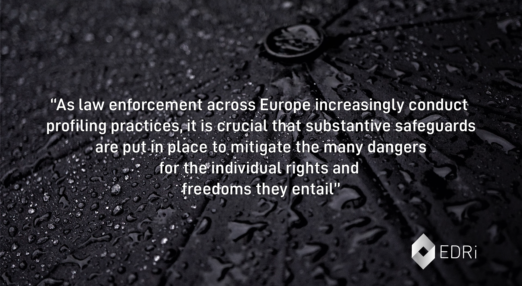profiling
Filter by...
-

Political negotiations continue: EU lawmakers fail to agree on strong rules for regulating political advertising
On 10 October, the European Parliament, the Commission and the EU Council had their fifth meeting (in the so-called trilogues) to find an agreement on the transparency and targeting of political advertising. The three institutions could not come to a consensus. Here is why.
Read more
-

“Social media profiles and phone contacts” used as proof of identity for deportations
Thirteen non-EU countries sometimes accept “social media profiles and phone contacts” as evidence of identity for the purpose of deportations, according to an internal European Commission assessment of third country cooperation on readmission.
Read more
-

TrustPid: Baking ad tracking into the internet infrastructure
A consortium of Europe’s largest telecommunications operators (telcos) has proposed a new kind of tracking ads system to challenge commercial surveillance heavyweights like Google and Facebook. The new tracking system, misleadingly dubbed ‘TrustPid’, would be baked into the internet’s network infrastructure – potentially with little recourse or defence for users.
Read more
-

The EU AI Act and fundamental rights: Updates on the political process
The negotiations of the EU’s Artificial Intelligence Act (AIA) are finally taking shape. With lead negotiators named, the publication of Council compromises, and the formation of civil society coalitions on the AIA, 2022 will be an important year for the regulation of AI systems.
Read more
-

Civil society calls on the EU to ban predictive AI systems in policing and criminal justice in the AI Act
40+ civil society organisations, led by Fair Trials and European Digital Rights (EDRi) are calling on the EU to ban predictive systems in policing and criminal justice in the Artificial Intelligence Act (AIA).
Read more
-

Secret negotiations about Europol: the big rule of law scandal
In negotiations held behind closed doors, the Council of Member States and the European Parliament are about to torpedo all the efforts of the European data protection watchdog’s to hold Europol accountable for its illegal data practices.
Read more
-

Hide and Seek: Polish DPA agrees that people should be able to access their advertising profiles, but there’s no way to do so
Following EDRi member Panoptykon’s General Data Protection Regulation (GDPR) complaint against one of the biggest Polish news website, Interia.pl - the Polish Data Protection Authority has confirmed that online publishers should give users access to their advertising profiles generated for the purposes of delivering behavioural ads.
Read more
-

UN Special Rapporteurs challenge EU’s counter-terrorism plans
Through their communication, the Special Rapporteurs demonstrate how several existing and foreseen EU security measures fail to meet the principles of legality, necessity and proportionality, enshrined in European and international laws (such as the Regulation on preventing the dissemination of Terrorism Content Online and the processing by Europol of sensitive data for profiling purposes). The fatal flaw lies in the use of broad and undefined terms to justify extensive interferences in human rights.
Read more
-

UK data regulator takes enforcement action to rein in data brokers’ use of people’s personal data
In a landmark decision that shines a light on widespread data protection failings by the entire data broker industry, the ICO has today taken enforcement action against Experian, based in part on a complaint Privacy International made in 2018.
Read more
-

Digital rights for all
In this article we set out the background to EDRis’ work on anti-discrimination in the digital age. Here we take the first step to explore anti-discrimination as a digital rights issue, and then, what can EDRi do about it? The project is motivated by the need to recognise how oppression, discrimination and inequality impact the enjoyment of digital rights, and to live up to our commitment to uphold the digital rights of all.
Read more
-

Stuck under a cloud of suspicion: Profiling in the EU
As facial recognition technologies are gradually rolled out in police departments across Europe, anti-racism groups blow the whistle on the discriminatory over-policing of racialised communities linked to the increasing use of new technologies by law enforcement agents.
Read more
-

Germany: Invading refugees’ phones – security or population control?
In its new study, EDRi member Society for Civil Rights (GFF) examines how German authorities sniff out refugees’ phones. The aim of “data carrier evaluation” is supposed to be determining a person’s identity and their country of origin. However, in reality, it violates refugees’ rights and does not produce any meaningful results.
Read more
